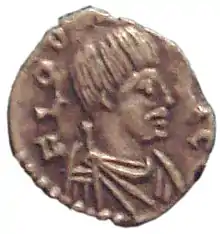Theodahad
Theodahad, also known as Thiudahad (Latin: Flavius Theodahatus Rex, Theodahadus, Theodatus; born c. 480 AD in Tauresium[4] – December 536) was king of the Ostrogoths from 534 to 536.
| Theodahad | |
|---|---|
| King of the Ostrogoths | |
 | |
| Reign | from 534 to 536 |
| Predecessor | Athalaric |
| Successor | Witiges |
| Born | c. 480 Tauresium, Eastern Roman Empire |
| Died | December 536 |
| Spouse | Gudeliva |
| Issue | Theodegisclus, Theodenantha[3] |
| Mother | Amalafrida |

Early life
Theodahad was a nephew of Theodoric the Great through his mother Amalafrida.[5] He is probably the son of Amalafrida's first husband because her second marriage was about 500 AD. His sister was Amalaberga.
He may have arrived in Italy with Theodoric and was elderly at the time of his accession. Massimiliano Vitiello states the name "Theodahad" is a compound of 'people' and 'conflict'.[6]
Before becoming king, his kinswoman Amalaswintha ruled.[7] During her rule, potential enemies were murdered or humiliated.[7] Theodahad was accused of land grabbing and forced to return land he had supposedly stolen.[7]
King
He arrested his first cousin Amalaswintha, former regent of the Ostrogoths from 526 to October 534, while they co-ruled as queen and king. He imprisoned her in the spring of 535 on an island in Lake Bolsena.[8] When Amalaswintha was assassinated while in custody, his enemies claimed he acquiesced to her murder. Since her assassination would likely separate him from her power base, this was unlikely.
Political instability within the kingdom served as a pretext for Byzantine general Belisarius to intervene in Sicily and Italy, in the service of Emperor Justinian, causing the Gothic Wars.
When his ineffectiveness in the war caused Theodahad to lose control, Witiges sent Optaris to retrieve him dead or alive, and Witigis became king.[9]
He was notable for his adoration for Neoplatonic philosophy and poetry over martial prowess. His focus on erudition instead of bellicosity, in a time when Italy was consumed by turmoil, is claimed to be a reason for his downfall.[10][2]
In fiction
Theodahad (as "Thiudahad") appears as a character in the alternate history novel Lest Darkness Fall, by L. Sprague de Camp.
References
- Hodgkin, Thomas (1896). Italy and Her Invaders. Clarendon Press. p. 651.
- Lillington-Martin, C. (2016), a review of Theodahad: A Platonic King at the Collapse of Ostrogothic Italy by Massimiliano Vitiello (2014) for University of Toronto Quarterly, Issue 85:3 (2016), 470-472. https://dx.doi.org/10.3138/utq.85.3.470.
- Arnold H.M. Jones et al. (ed.), The Prosopography of the Later Roman Empire: Volume 2, AD 395-527, Cambridge: University of Cambridge Press 1980, p. 1067.
- Wolfgang Kuhoff (1996). "Theodahadus, Flavius, König der Ostgoten 534-536". In Bautz, Traugott (ed.). Biographisch-Bibliographisches Kirchenlexikon (BBKL) (in German). 11. Herzberg: Bautz. cols. 824–832. ISBN 3-88309-064-6.
- Jordanes names Amalfridam germanam suam [Theoderici] as the mother of Theodehadi qui postea rex fuit
- Massimiliano Vitiello, Theodahad, A Platonic King at the Collapse of Ostrogothic Italy, Toronto: University of Toronto Press 2014, p. 15.
- Heather, P. J. (Peter J.) (2018). Rome resurgent : war and empire in the age of Justinian. New York, NY. ISBN 9780199362745. OCLC 1007044617.
- Jordanes, LIX, p. 51, and Herwig Wolfram (1998), p. 338
- Hughes, Ian (Historian) (2009). Belisarius : the last Roman general. Yardley, Pa.: Westholme. ISBN 9781594160851. OCLC 294885267.
- M. Vitiello, Theodahad: A Platonic King at the Collapse of Ostrogothic Italy (2014).
External links
- Theodahad in Medieval Lands
| Regnal titles | ||
|---|---|---|
| Preceded by Amalasuntha |
King of the Ostrogoths 534–536 |
Succeeded by Witiges |


